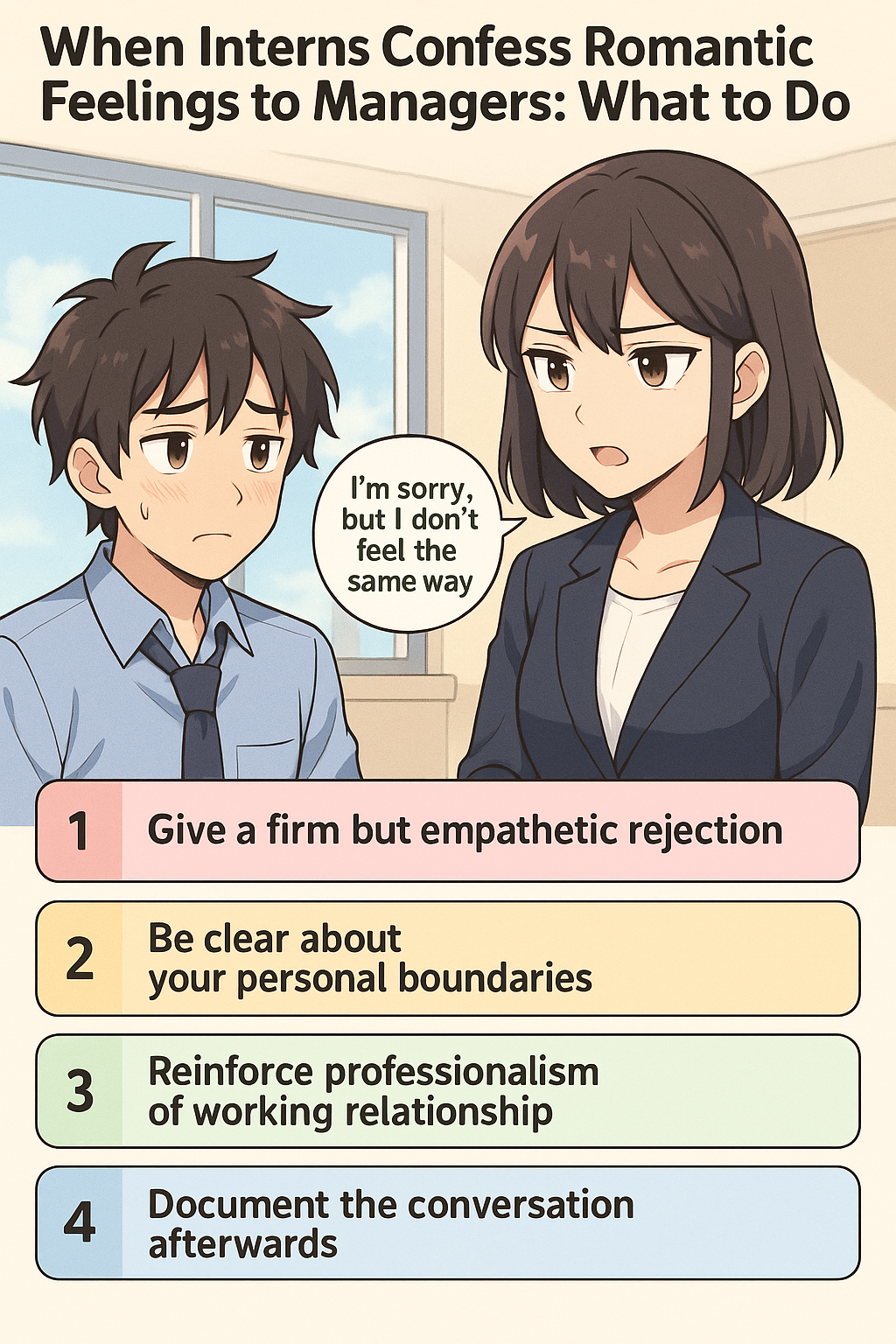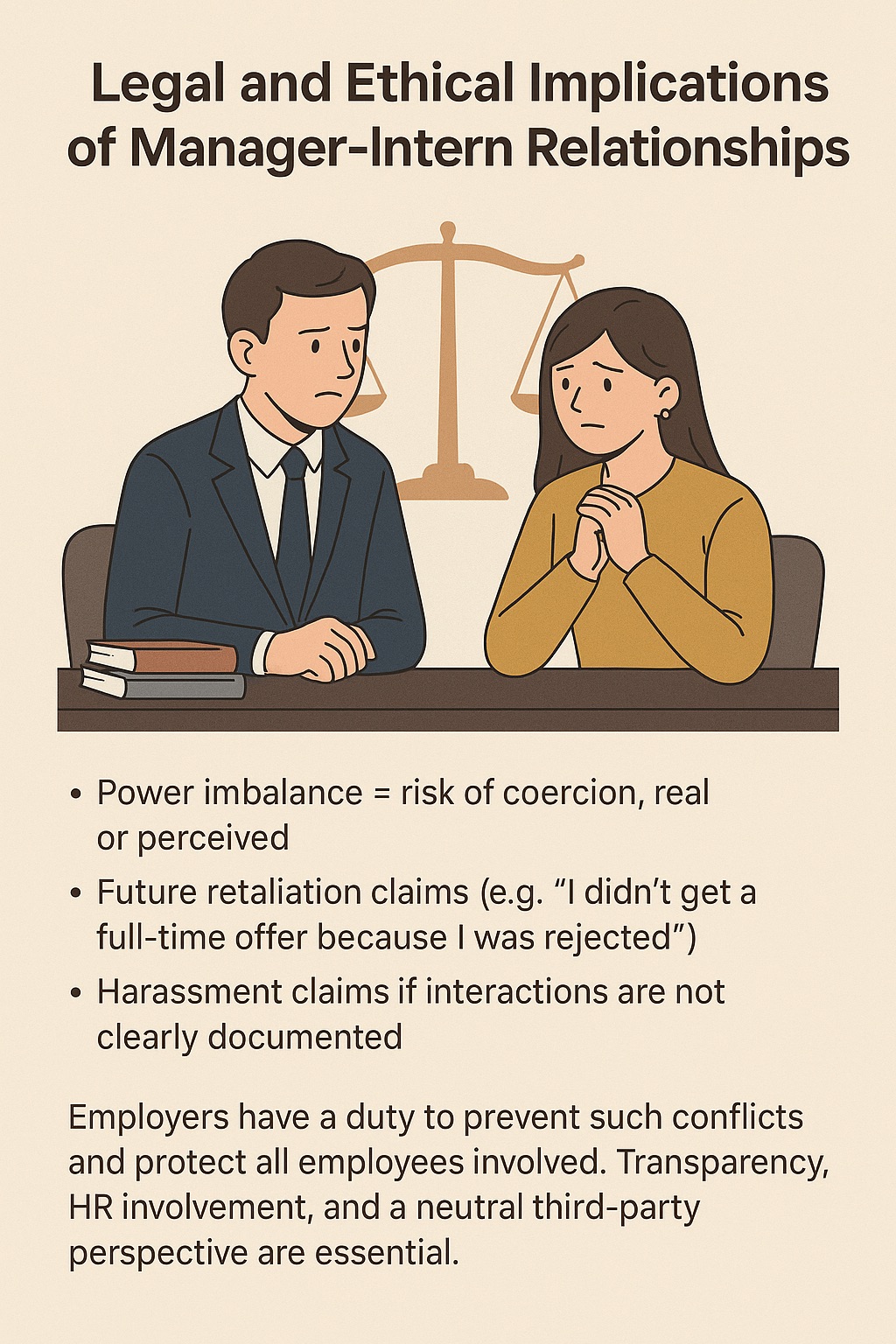Workplace relationships are complex—especially when emotions enter the equation. As professionals, we’re taught to foster trust, build rapport, and support our team members. But what happens when that trust becomes emotionally complicated—particularly in situations involving interns or direct reports?
In this case, a young manager found herself at the center of an emotional conflict after her intern confessed romantic feelings. While both were close in age and shared common interests outside work, the situation quickly became uncomfortable and raised important questions about professional boundaries, manager responsibilities, and HR protocol.
This article explores how to navigate such scenarios with empathy, professionalism, and a clear understanding of company policy. Whether you’re an HR professional, a team leader, or an intern yourself, you’ll find key takeaways on managing personal boundaries at work.
1. Understanding Workplace Boundaries Between Managers and Interns
Managers and interns can sometimes be close in age—especially in early career environments like tech, startups, or research internships. Shared interests can easily blur the lines between professional mentorship and personal friendship.
While casual interactions such as gaming or socializing after work can help build team rapport, they also increase the risk of emotional entanglements—especially when clear professional boundaries are not actively maintained.
Interns may not fully grasp the power dynamic in place. Even if it feels like a peer-to-peer friendship, managers are still authority figures—and that affects how romantic advances are perceived and responded to.
2. When Interns Confess Romantic Feelings to Managers: What to Do
Romantic confessions from interns to their managers are rare but not unheard of. In this story, the intern’s honesty—though emotionally raw—presented a clear challenge: how should the manager respond while preserving professionalism?
The best immediate response includes:

-
A firm but empathetic rejection
-
Clarity about your personal boundaries
-
A clear reinforcement of the working relationship’s professional nature
-
Documentation of the conversation, even if just personal notes
In this case, the manager also disclosed her sexual orientation and relationship status, which helped clarify that the interest was not mutual. However, emotional fallout still affected the team dynamic, which is why the next steps are crucial.
3. How Workplace Relationships Affect Power Dynamics and Team Culture
Even if a manager doesn’t return romantic interest, a declaration like this shifts the power dynamic instantly. The intern may feel embarrassed, rejected, or confused—and may start avoiding interactions. The manager, meanwhile, might feel pressured to walk on eggshells to avoid triggering discomfort.
This breakdown in communication can harm productivity, derail mentorship, and affect broader team cohesion. In worst-case scenarios, unresolved tension could be perceived as favoritism, retaliation, or a toxic work culture.
That’s why companies emphasize emotional boundaries—especially between supervisors and subordinates.
4. Should You Report to HR if an Intern Confesses Feelings?
Yes—HR should be informed, even if you believe the situation is under control. Here’s why:
-
It documents the event in case future issues arise
-
It allows HR to provide guidance on team reassignment, offer management, or mentorship changes
-
It protects you as a manager by showing proactive communication
You don’t need to frame it as a complaint—rather, as a request for guidance to preserve professionalism and comfort for both parties. In many companies, relationships between managers and their reports are strongly discouraged or even prohibited. Early intervention helps avoid escalations or legal complications.
5. Managing Emotions After a Workplace Rejection
It’s important to recognize that workplace crushes are often rooted in admiration or personal connection—not always in deep romantic intent. After rejection, interns may feel embarrassed or anxious about their future at the company.
As a manager, your role is not to become a therapist, but you can:
-
Acknowledge their emotions with empathy
-
Reaffirm your professional respect for their work
-
Create space while still maintaining communication on tasks
It’s also OK to request distance or a team change if the interaction makes you uncomfortable, especially if it affects your performance or wellbeing.
6. How to Prevent Future Boundary Issues in the Workplace
While we can’t control how others feel, we can reduce the likelihood of awkward situations by:
-
Avoiding social situations that may be misinterpreted (e.g., 1:1 hangouts outside work)
-
Establishing clear boundaries early, especially with direct reports
-
Being transparent about your relationship status (when appropriate and safe)
-
Discussing the company’s expectations for manager-intern relationships during onboarding
You don’t need to isolate yourself to be professional, but understanding the influence of your role helps you lead with clarity.
7. What If the Intern Returns Next Year? Planning Ahead
One of the biggest dilemmas in this case is whether the intern should return to the same team in the future. Here are your options:
-
Recommend reassignment to a different team or manager
-
Ask HR for structured communication protocols (e.g., limited 1:1 interactions)
-
Offer a neutral explanation for the reassignment to avoid drama
While the intern may no longer harbor feelings by next year, the discomfort created by the confession might linger. Your psychological safety and the team’s health should be prioritized.
8. Legal and Ethical Implications of Manager-Intern Relationships
Even in consensual circumstances, romantic relationships between managers and direct reports can raise legal concerns:

-
Power imbalance = risk of coercion, real or perceived
-
Future retaliation claims (e.g., “I didn’t get a full-time offer because I was rejected”)
-
Harassment claims if interactions are not clearly documented
Employers have a duty to prevent such conflicts and protect all employees involved. Transparency, HR involvement, and a neutral third-party perspective are essential.
9. Boundaries Are a Form of Professional Respect
When personal emotions enter professional spaces, things get complicated—but not unmanageable. The key is to respond with honesty, empathy, and clear boundaries. As a manager, you also have the right to feel comfortable and respected in your role. Involving HR isn’t creating drama—it’s creating structure.
If you’re unsure what to do, document the situation, speak to HR or a mentor, and always prioritize respect—for yourself, your team, and your workplace.
Frequently Asked Questions (FAQ)
Q1: Should I tell HR if an intern expresses romantic interest in me?
A: Yes. Even if the interaction was respectful and you feel it’s been resolved, informing HR is the safest route. It helps document the event, allows HR to offer guidance, and ensures transparency—especially if the intern is being considered for a return offer or full-time role.
Q2: Is it illegal to date a direct report?
A: While not always illegal, romantic relationships between managers and direct reports are ethically risky and may violate company policy. Many organizations prohibit such relationships to avoid power imbalance issues, potential harassment claims, or accusations of favoritism or retaliation.
Q3: What if I didn’t encourage the intern’s feelings—do I still need to take action?
A: Yes. Even if you didn’t reciprocate or lead them on, the situation still affects your professional environment. Failing to address it can create discomfort, miscommunication, or perceived bias on the team. Reporting the situation protects everyone involved.
Q4: Can I request that the intern not return to my team in the future?
A: Absolutely. If the situation made you uncomfortable or if you believe ongoing interaction would affect team dynamics, you can suggest reassignment. HR can help coordinate this in a respectful and professional manner without penalizing the intern.
Q5: How can I set healthy boundaries with interns without being cold?
A: Healthy boundaries don’t mean emotional distance—they mean clarity. Keep interactions professional during work hours, avoid one-on-one socializing outside of work, and be transparent about your expectations. Boundaries foster mutual respect and reduce confusion.
Q6: What’s the risk if I don’t report or document a confession like this?
A: If any workplace tension arises later—such as performance concerns, feedback misunderstandings, or hiring decisions—the prior interaction could be misinterpreted or used as evidence in a complaint. Proper documentation and early HR involvement prevent misunderstandings from escalating.
Q7: Can an intern’s feelings affect team morale or dynamics?
A: Yes. Emotional discomfort, avoidance behavior, or perceived favoritism can undermine productivity and morale. Addressing the issue openly (through HR channels) allows the team to stay focused and collaborative.
Q8: Is it okay to continue mentoring the intern after rejecting them?
A: It depends on the comfort level of both parties. If the intern is professional and interactions remain productive, continuing the mentorship may be possible. However, if discomfort lingers or boundaries become blurry, it’s best to step back and delegate mentorship responsibilities.
Q9: What if I’m unsure whether to report the situation or not?
A: When in doubt, talk to HR or a trusted mentor confidentially. You can frame it as seeking guidance rather than reporting a problem. The goal is to protect both your role and the intern’s development within a respectful, well-structured environment.
Q10: How can organizations prevent these situations in the first place?
A: Clear onboarding policies, manager training on emotional boundaries, and open communication channels with HR can help. Promoting a culture where boundaries are understood and respected ensures safer and more professional relationships across all levels.
